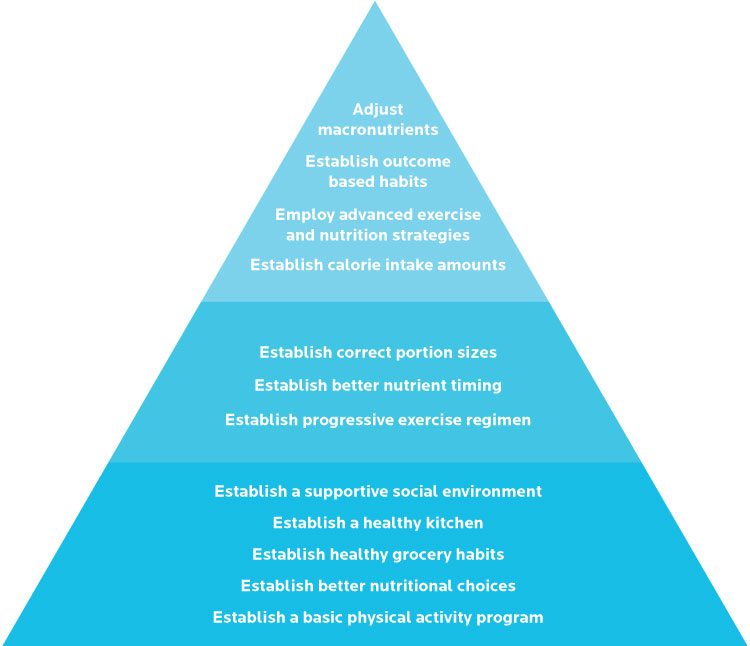Have you ever wondered why you aren’t succeeding despite “knowing” what to do? Maybe you’ve read every nutrition textbook in the library and aren’t lean yet. The problem might not be how much you know… it might be what’s around you.
When it comes to making life changes, we hear a lot about the importance of “mindset”. How you look at the world can shape the way you approach problems and view your experiences. And this happens both consciously and unconsciously.
Notice the latter part: many of our assumptions and worldviews are unconscious. We aren’t aware of them, even as we’re thinking them.
Have you ever “zoned out” while driving, and then realized you’re 10 miles down the road, not sure how you got there?
You must have been paying attention on one level, or you’d have crashed the car. And yet, most of your mind was elsewhere. Your unconscious brain was handling the job of driving while your conscious brain was focused on getting your errands done, what happened to you at work that day, solving Fermat’s Last Theorem, or whatever else you think about.

The way we approach health and nutrition is similar. There are ideas and thoughts that we’re aware of, and ideas and thoughts that we’re not. We can dive down into our brains to fish for our unconscious and subconscious thoughts and bring them to the surface. This might include unconscious thoughts like:
- I’m not worthy of self-care.
- I don’t deserve to look good.
- Looking good is for vain people.
- Eating bad food makes me feel good.
- I don’t want people to notice me.
- If I stay overweight, I won’t have to be social.
It can be a minefield in there! This will take some time to clear!
Self-analysis is an important — indeed, even essential — project, but it takes time and effort. It might take weeks, months, or even years to untangle all of our thoughts and assumptions about health and nutrition.
But you want to start getting in shape NOW! What do you do in the meantime while you’re digging around in your brain?
Change your environment.
How to change your environment
You can immediately change what’s around you. This includes things like:
- Your daily routine
- What tools you have available to you
- The people you interact with
- What foods you have near you (or far away from you)
Having trouble making it to the gym? Get home equipment.
Can’t seem to kick the PM ice cream and cookie routine? Don’t keep ice cream and cookies in the house.
Having trouble getting enough veggies? Buy veggies at the grocery store and keep them at your residence.
Surfing the internet keeping you up too late at night? Get rid of the internet at home.
Friends always taking you out for pizza and beer? Talk to them about your goals. Explore other options for socializing. And look for opportunities to develop new friends, too.
Often times we convince ourselves that what we know (PN, for example) and what we plan for (our exercise and nutrition plan) will allow us to coast through any health and fitness obstacles that get in our way.
Control your environment — before it controls you
Click here to download an excellent article by researcher Brian Wansink, author of Mindless Eating. He describes the ways in which portion sizing has changed over the years, and how this affects our behavior. There are two basic ideas here:
- Most of us will eat all that we are served — no matter how big the portion is. If we are served a small bag of popcorn, we’ll eat that. If we are served a bucket of popcorn, we’ll eat that. Presumably if we are served a Volkswagen full of popcorn, we’d do our best to finish that off too.
- If we consistently eat bigger portions, bigger portions will seem “normal”. Our great-grandparents would be astounded at the platters of ribs and Super Big Gulps that are commonplace in the US. (Other countries are slowly changing, but the US has the largest portions for now.) We’ve lost our perspective on how much we should really be eating.
The article also points out that even “experts” can be fooled. No matter how much you know, you can still be affected by what’s around you.
Conversely, even if you don’t know something, your environment can affect you.
Have you ever been traveling and stuck on a delayed plane that’s sitting on the tarmac? You aren’t going anywhere. Nobody is serving drinks or snacks. Heck, you can’t even get up to go to the bathroom! In that moment, it doesn’t matter how much you know about nutrition — you aren’t getting a meal.
Your environment is your foundation
If you think of body composition change as a pyramid, here’s what the pyramid should look like.

Notice that all the “expert information” stuff — adjusting macronutrients, advanced nutrition strategies, etc. — is at the top. It’s the smallest component, and the last one to occur in your development.
Notice that the base of the pyramid is what surrounds you: your social environment, your kitchen, your grocery habits, your day-to-day routine.
Changing your thinking eventually is essential. But in the meantime, it is much easier to change your environment than it is to change your mind.
Set yourself up for success
As I mentioned in the previous examples, you need to set yourself up for success. Many times our environments create the “norm.” Junk food, no exercise, sedentary living, hours and hours of TV watching, etc. We can be very impressionable when it comes to our levels of physical activity and how much we eat.
Here are some ideas:
- Use smaller plates and cups. We’re often used to just filling the dish and eating till the food is done.
- If there’s a food you don’t want to eat, get it away from you. Don’t keep it in the house. Make it hard to get.
- Conversely, if there’s a food you should be eating, make it easier to get.
- Sign up for a CSA box so that fresh, healthy produce and/or organic meat is delivered to you.
- Have fresh, healthy whole foods on hand and prepared. If necessary, buy pre-cut veggies.
- If you have more money than time, consider signing up for a healthy meal delivery service.
- Put the TV in an inconvenient place or make the seating in front of it uncomfortable. Cut your cable package down so you don’t have 200 channels of junk. Or better yet, get rid of the thing altogether.
- Park your car farther away from where you’re going so you have to walk. Or sell the car and get a bike. (Check out Large Fella on a Bike to see an example of a guy who went from a near-death 501 lbs to a lean, fit 170 lbs after getting a bike and deciding to ride it every day.)
- Join a social group organized around activity: a class, club, or meetup group (e.g. hiking tours). Find a workout buddy. Surround yourself with people who are also working on their health, fitness, and nutrition. Organize your social events around activity — get a bunch of friends together in the park for some Ultimate Frisbee!
- Get a dog that needs walking — one that will chew up your couch as punishment if you don’t take it for a daily spin around the block.
You’ll notice that these tips share two features:
- They make problem behaviors inconvenient.
- They make healthy behaviors convenient.
In the battle between knowledge and environment, environment wins most often. If you think it is time to switch up your environment, do it. Indeed, it may be the only way for you to stimulate new progress.
Eat, move, and live…better.©
The health and fitness world can sometimes be a confusing place. But it doesn't have to be.
Let us help you make sense of it all with this free special report.
In it you'll learn the best eating, exercise, and lifestyle strategies – unique and personal – for you.
Click here to download the special report, for free.
If you’re a coach, or you want to be…
You can help people build sustainable nutrition and lifestyle habits that will significantly improve their physical and mental health—while you make a great living doing what you love. We'll show you how.
If you’d like to learn more, consider the PN Level 1 Nutrition Coaching Certification. (You can enroll now at a big discount.)

Share